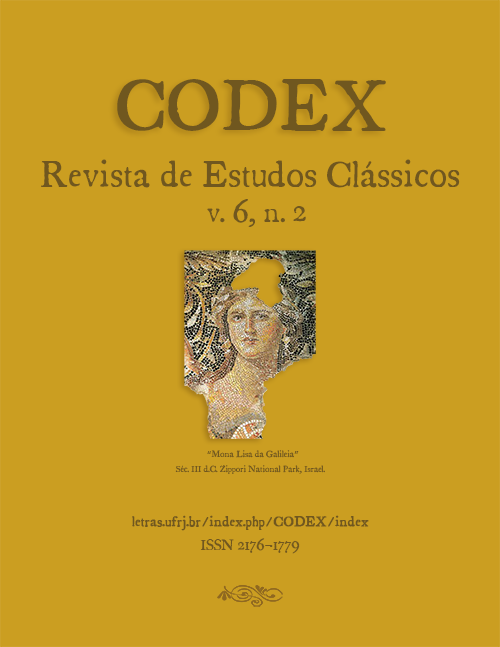Focalization: the use of evaluative adjectives and the narrator of the Iliad
DOI:
https://doi.org/10.25187/codex.v6i2.19284Keywords:
evaluative comments, focalizer, Iliad, primary narrator, oral epic Greek poetryAbstract
The main purpose of this paper is to investigate, applying narratology to early Greek hexameter poetry, moments when the primary narrator, in the pursuit of his activity as a focalizer, exposes his presence in the Iliad. In order to do this, we selected excerpts of the poem in which the narrator uses evaluative adjectives or establishes a difference between his own narration and the secondary ones by means of the filter he applies. We discuss evaluative adjectives that qualify the gods and humans and how they reveal a partial narrator who makes moral judgments about the gods, their objects and actions, and the humans. A second objective is to discuss the instance responsible for the narrative: divine, in view of the invocation of the Muse in the proem and in other moments of the poem, or human, in view of the traditional attribution of the singing to Homer.References
AUER, Peter; VON ESSEN, Gesa; FRICK, Werner (Ed.). Author and Narrator: Transdisciplinary Contributions to a Narratological Debate. Berlin, Munich, Boston: De Gruyter, 2015.
BAKKER, Egbert. Pointing to the past: from formula to performance in Homeric poetics. Cambridge: Center for Hellenic Studies, 2005.
BAL, Mieke. Narratology: introduction to the theory of narrative. 3. ed. Toronto: University Of Toronto Press, 2009.
BOWIE, E. L.. Lies, Fiction and Slander in Early Greek Poetry. In: GILL, Christopher; WISEMAN, T.p. (Ed.). Lies and Fiction in the Ancient World. Texas: University Of Exeter Press, 1993. p. 1-37.
BRANDÃO, Jacyntho Lins. Antiga Musa: (arqueologia da ficção). 2. ed. Belo Horizonte: Relicário, 2015.
CUNLIFFE, Richard John. A Lexicon of the Homeric Dialect. Norman: University Of Oklahoma Press, 1963.
DE JONG, Irene J. F. A Narratological Commentary on the Odyssey. Cambridge: Cambridge University Press, 2001.
_________, Irene J. F. Homer. In: NÜNLIST, René; BOWIE, Angus M.; DE JONG, Irene J. F. (Ed.). Narrators, Narratees, and Narratives in Ancient Greek Literature: Studies in Ancient Greek Narratives. Netherlands: Brill, 2004b p. 13-24.
_________, Irene J. F. Narratology and Classics: A Practical Guide. Oxford; Oxford University Press, 2014.
_________, Irene J. F. Narrators and Focalizers: The Presentation of the Story in the Iliad. 2. ed. London: Bristol Classical Press, 2004a.
FOLEY, John Miles. Oral Tradition and its implications. In: MORRIS, Ian; POWELL, Barry (Ed.). A New Companion to Homer. Leiden/New York/Koln: Brill, 1997. p. 146-173.
GRAZIOSI, Barbara; HAUBOLD, Johannes. Homer: The Resonance of Epic. London: Bloomsbury, 2005.
GRIFFIN, Jasper. Homeric Words and Speakers. The Journal Of Hellenic Studies, [s.l.], v. 106, p.36-57, nov. 1986. Cambridge University Press (CUP). http://dx.doi.org/10.2307/629641.
HALLIWELL, Stephen. Between Ecstasy and Truth: Interpretations of Greek poetics from Homer to Longinus. Oxford: Oxford University Press, 2011.
HOMERO. Ilíada. São Paulo: Companhia das Letras, 2013. 721 p. Tradução de Frederico Lourenço.
HOMERO. Odisseia. São Paulo: Cosac &Naify, 2014.640 p.Tradução de Christian Werner.
HÜHN, Peter; PIER, John; SCHMID, Wolf (Ed.). Handbook of Narratology. Berlim, Boston: De Gruyter, 2009.
KELLY, Adrian. A Referential Commentary and Lexicon to Homer, Iliad VIII. Oxford: Oxford University Press, 2007.
LORD, Albert Bates. The Singer of Tales. New York: Harvard University Press, 1960.
MALTA, André. A musa difusa: visões da oralidade nos poemas homéricos. São Paulo: AnnablumeClássica, 2015.
MARTIN, Richard P..The language of Heroes: Speech and Performance in the Iliad. Ithaca/London: Cornell University Press, 1989.
MURRAY, Penelope. Poetic inspiration in early Greece. The Journal Of Hellenic Studies, [s.l.], v. 101, p.87-100, nov. 1981. Cambridge University Press (CUP). http://dx.doi.org/10.2307/629846.
NAGY, Gregory. Homer the classic. Washington DC.: Center for Hellenic Studies, 2009.
_________, Gregory. Homer the preclassic. Berkeley: University of California Press, 2010.
PARRY, Milman. The Making of Homeric Verse: The collected papers of Milman Parry. Oxford: Clarendon Press, 1971.
REIS, Carlos; LOPES, Ana Cristina M. Dicionário de teoria da narrativa. São Paulo: Ática, 1988.
RYAN, Marie-laure. Story-Discourse Distinction. In: HERMAN, David; JAHN, Manfred; RYAN, Marie-laure (Ed.). Routledge Encyclopedia of Narrative Theory. Oxfordshire: Routledge, 2005. p. 566-567.
SCODEL, Ruth. The story-teller and his audience. In: FOWLER, Robert (Ed.). Cambridge Companion to Homer. Cambridge: Cambridge University Press, 2004. p. 45-55.
VAN THIEL, H. Homeri Ilias. Hildesheim, Zürick, New York: Olms, 2010.
VAN THIEL, H. Homeri Odyssea.Hildesheim: Olms, 1991.
WERNER, Christian. Memórias da Guerra de Tróia: a performance do passado épico na Odisseia de Homero. São Paulo: Imprensa da Universidade de Coimbra/Annablume Editora, 2018.
Downloads
Published
How to Cite
Issue
Section
License
This work is licensed under a Creative Commons Attribution-NonCommercial 4.0 International License.










